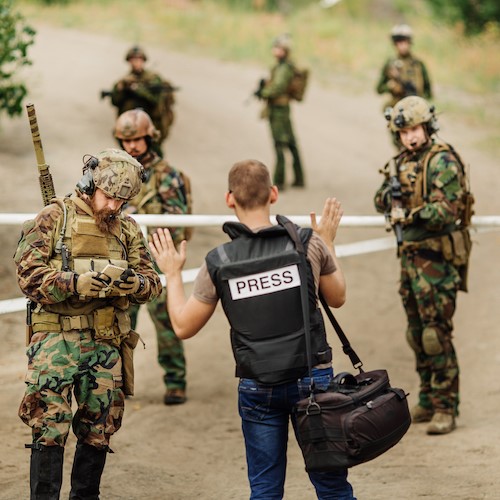Highlight 36/2022 – The role of Security Sector Governance/Reform in protecting freedom of information in conflict zones
Cyril Yemofio, 1 June 2022

Media communications have always been an integral part of a well-functioning society. Well before the inception of the printing press, societies and civilisations found ingenious ways to transmit information. Some, like the Romans and Greeks, depended on very articulate orators, whereas in Africa, drums, horns and storytellers were the leading media in transmitting information to the masses. Years on, we have swiftly witnessed the evolution of disseminating information. Journalism through the printing press, radio, television and social media is evidence of the influence information has on societies. Andrew Vachss, an American author, described journalism as a means of maintaining democracy and a force for progressive change and I could not agree more with his observations.
Despite this progress, journalism is a dangerous occupation, especially in conflict zones and zones of public unrest. During uncertain times, journalists and media communication workers have the difficult task of covering and making sure that people’s stories, sometimes of abuse, intimidation and threats, are shared with the world. Of course, this comes with its dangers, either to the journalists/media men or the people sharing the stories themselves. In May 2022, we witnessed the assassination of a well-renowned journalist, Shirin Abu Akleh, of Al Jazeera, who was gunned down whilst reporting on the Israeli-Palestinian conflict. Sadly, she is one of many victims who have been detained, imprisoned or in worst cases succumbed to the risks of their trade whilst trying to tell people’s struggles in conflict zones and zones of public unrest. Reporters Without Borders has acknowledged that, from January to May 2022, there have been 28 journalists and media workers killed, and around 70 imprisoned around the world, with a lot more facing persecution and abuse daily. Whilst these are just some of the cases known to the public, a lot more go through these pains without their stories ever being told nor heard.
In 2015, the United Nations Security Council passed a resolution on the protection of journalists and associated media personnel in armed conflict (Security Council resolution 2222). Nonetheless, the continuous abuse of journalists has been reported in regions all over the world with little to no accountability. Governments and security sector actors could and should do more to protect the rights and freedoms of people in this domain. Some mechanisms to protect the rights and freedoms of those who risk their lives to share important stories around the world are: internal audits in the military and police sectors, increased accountability for rebel groups and militia who commit acts of violence or intimidation towards journalists and media workers, or strengthened capacity building and effective training of police and military in the treatment of press workers. After all, “journalism wishes to tell what it is that has happened everywhere as though the same had happened for every man”, as eloquently put by Archibald MacLeish, a Pulitzer winning writer and poet.
Cyril Yemofio, Highlight 36/2022 – The role of Security Sector Governance/Reform in protecting freedom of information in conflict zones, 1 June 2022, available at www.meig.ch
The views expressed in the MEIG Highlights are personal to the author and neither reflect the positions of the MEIG Programme nor those of the University of Geneva.
